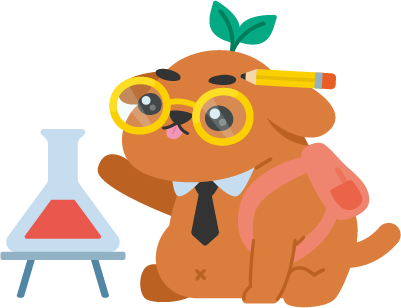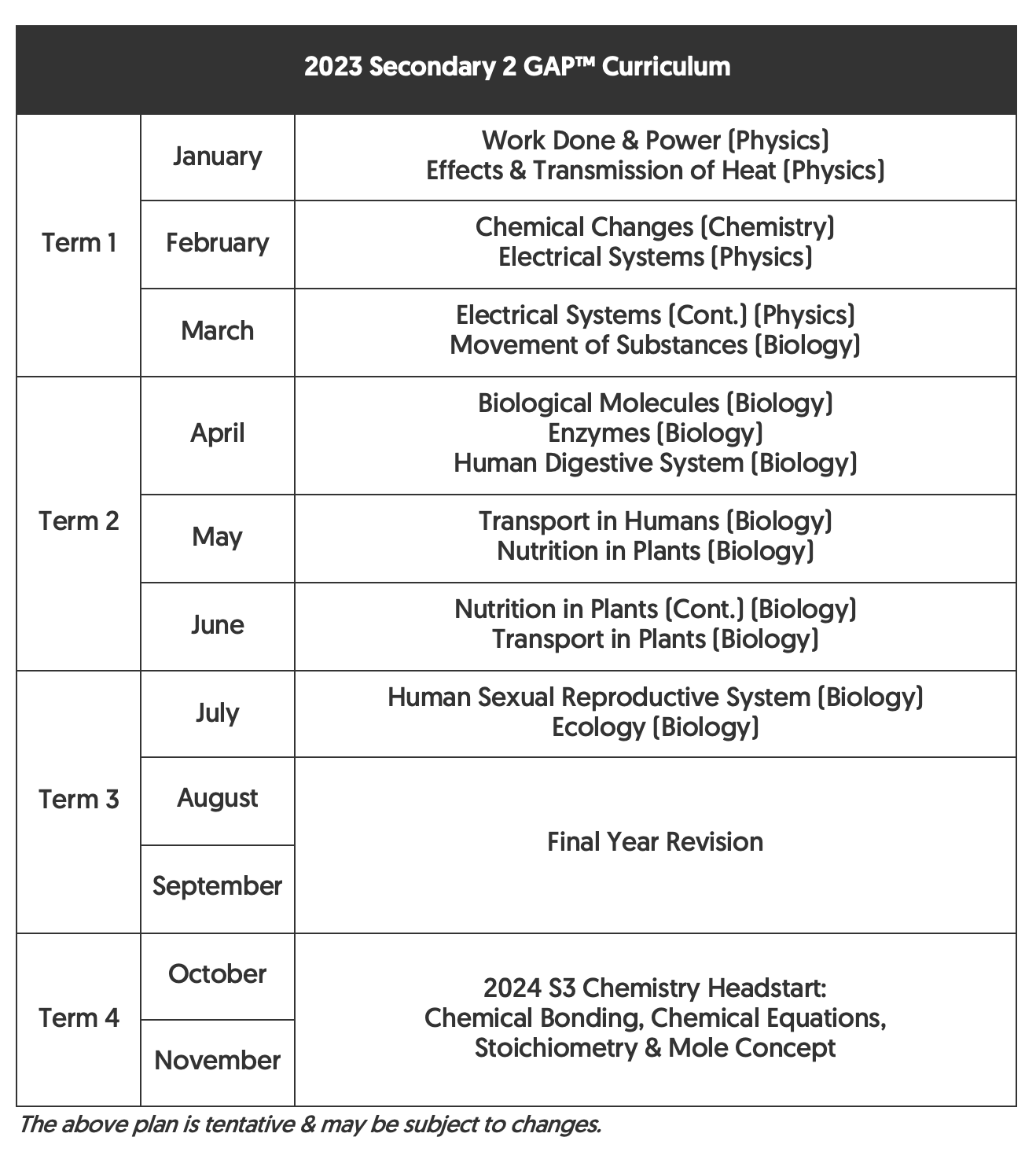
Dear Parents & Students
2023 S2 Grade Accelerator Programme
Here’s How We Intend To Help You Succeed.
Here’s What We’ll Be Covering In The Upcoming Months
Students often exclaim that secondary science content is very difficult. However, is that really true? The simple answer is no. Here are 3 common challenges faced by most students.
Challenge 1: There is little content overlap between primary school science and secondary school science.
Referencing the S2 topic coverage above, 7 out of the 14 topics have been taught (albeit in a simplified manner) in primary school. This also means that more than 50% of the content taught to students is completely new.
Challenge 2: The question trends and style in which secondary school questions are being set are different from what students are used to tackling in primary school.
Considering that most of the content taught is new, the students typically have limited question exposure to question types and trends. Additionally, unlike in primary school where school test papers are easily available for purchase in the open market, students will find that practice questions are limited to the school’s materials as well as assessment books. The result of these constraints is a lack of question exposure, leading to an incomplete understanding of how to adequately prepare for examinations.
Challenge 3: Given the wide breadth of content to cover and limited time, students are unsure of what to memorise exactly and eventually decide that memorising every piece of information is the only way moving forward.
For most students, their capacity to memorise is not unlimited. Thus, It is important to strategise when it comes to memory work.
Here’s How We Plan To Help You Succeed at The Pique Lab
- Topical Teaching
For each topic, carefully curated past-year examination questions are compiled into In-Class Exercises (ICE), Homework (HW) and Topical Tests (TT).
The concepts from the ICE and HW worksheets are introduced in a systematic manner, enabling students to gain an understanding of the content with ease. At the end of each topic, an open-book topical test is administered. To complete your child’s topical revision, he/she will be provided with a topical study guide with blanks to be filled in. The study guides provide direction on the important memory work components for each topic and aid their understanding of the subject matter.
You may be wondering – Why are our topical tests open-book?
From our teaching experience, given the tight schedule of secondary school students, it is not realistic to expect students to prepare for the topical test the same way they do so for their school examinations. However, what is important is for us to assess whether your child knows where to find the relevant information from the materials provided. We also want to understand if your child is able to utilise the appropriate thought process to analyse and answer the examination questions accurately.
Over the years, we have also realised that the act of “flipping through the notes” to find answers during topical tests is a good way to force less disciplined students to get some revision done.
- Exam Revision
To ensure that students are adequately prepared for his/her streaming year, we have planned our curriculum in such a manner that allows us to finish teaching the syllabus in July. This provides us with a comfortable 2 to 3 months to prepare your child for the final examinations. As part of their revision, we will be reviewing past-year examination papers in class to consolidate the content taught to your child over the past 2 years.
Additionally, topical practices will be provided as part of the “Topical Revision Series” or TRS for short. Due to time constraints, these TRS practices will not be reviewed in class. Your child is expected to complete them in his/her own time and seek clarifications from his/her tutor as needed.
From October Onwards
In October & November, we will begin the bridging for S2 to S3 Chemistry to give students a head start for the upcoming year. These lessons will run till the end of November.
Given that The Pique Lab currently only offers O-Level Chemistry (also known as Pure Chemistry), which is a core science subject at the upper secondary level, we have chosen 3 major topics from S3 chemistry in order to bridge S2 to S3 Chemistry concepts.
S2 to S3 Chemistry Bridging Topics*
- Chemical Bonding
- Chemical Equations
- Stoichiometry & Mole Concept
*Subject to changes.
How do the bridging topics benefit your child?
It is common for students to feel that upper secondary science is taught at a faster pace than lower secondary science.
To overcome this challenge, we will be reviewing one of the hardest segments of S3 chemistry, dubbed “the math of chemistry”. I am sure that you would agree with me if I said that concepts relating to math require practice, and practice requires time. Our strategy for your child moving up to Secondary 3 is to master stoichiometry during the post-exam lull, such that he/she will be able to better manage the fast-paced nature of upper secondary school learning.
In December, our Centre will be closed for the month and we will resume classes on the first week of January.
What If The Topic Sequence Doesn’t Match Your Child’s School Curriculum?
As you may be aware, different schools teach topics in different sequences and your child’s school curriculum may not be perfectly aligned with the curriculum of our Grade Accelerator Programme.
Here at The Pique Lab, we teach an accelerated curriculum and our end goal is to cover the entire syllabus and have ample time for revision for the final year examination.
If your child has not learned a topic that is taught during the Grade Accelerator Programme, it will be a head start for him/her before the topic is taught during the school curriculum.
If your child has learnt it in school previously, it will be a good reinforcement for him/her as he/she might not have a thorough understanding of the topic when he/she was taught in school.
Throughout your child’s academic year with us, should he/she be taught a different topic from our internal curriculum, we will provide an additional topical study guide, on request, for him/her to work on in his/her own time.
Is Your Child Ready For The Big Year Ahead?
Over the years, we have also learnt that parents play a pivotal role in the academic success of their child. In particular, we discovered that students typically achieve breakthroughs faster in Science if their parents coach and monitor them at home regularly.
In order to offer the best learning experience for your child, we also strive to provide an amazing support system for parents, like you.
For starters, here is how you can help your child improve more quickly:
#1: Ensure that your child completes his/her homework properly & punctually and brings them back to class.
#2: Ensure that your child reviews our notes and worksheets during the week.
#3: Ensure that your child is adequately prepared for our tests.
#4: If your child is unclear of a concept or has a question, he/she is highly encouraged to approach his/her teacher.
Please note that only topical tests & graded assignments given in the weekly classes will be marked for all learning arrangements. Homework that is given in the weekly classes will be reviewed together as a class and will not be marked.
Thank you & all the best! 😇
